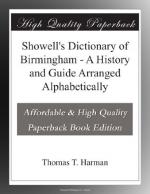Digby, John, made Lord Digby in 1618, and Earl of Bristol in 1622, was born at Coleshill in 1580. He was sent Ambassador to Spain by James I. to negotiate a marriage between Prince Charles and the Infanta. He went abroad when the Civil War broke out, and died at Paris in 1653.
Edmonds.—George Edmonds, was a son of the Baptist minister of Bond Street Chapel, and was born in 1788. For many years after he grew up George kept a school, but afterwards devoted himself to the Law, and was appointed Clerk of the Peace on the incorporation of the borough. For taking part in what Government chose to consider an illegal meeting Mr. Edmonds had to suffer 12 months’ imprisonment, but it only increased his popularity and made him recognised as leader of the Radical party. During the great Reform movements he was always to the fore, and there can be little doubt that it was to his untiring energy that the Political Union owed much of its success. In his later years he printed (partly with his own hands) one of the strangest works ever issued from the press, being nothing less than an alphabet, grammar, and dictionary of a new and universal language. On this he must have spent an immense amount of philosophical and philological research during the busiest years of his active life, but like other schemes of a similar character it came into the world some scores of generations too soon. His death took place (hastened by his own hand) July 1, 1868.
Everitt, Allen Edward.—Artist, antiquarian, and archaeologist. It is reported that his portfolio contained more than a thousand sketches of his own taking, of old churches, mansions, cottages, or barns in the Midland Counties. Born here in 1824 Mr. Everitt had reached his 55th year before taking to himself a wife, whom he left a widow June 11, 1882, through catching a cold while on a sketching tour. He was much loved in all artistic circles, having been (for twenty-four years) hon. sec. to the Society of Artists, a most zealous coadjutor of the Free Libraries Committee, and honorary curator of tha Art Gallery; in private or public life he spoke ill of no man, nor could any speak of him with aught but affection and respect.
Fletcher, George.—Author of the “Provincialist” and other poems, a journeyman printer, and much respected for his genial character and honest kind-heartedness. Died Feb. 20, 1874, aged 64.
Fothergill, John.—Taken into partnership by Matthew Boulton in 1762, devoting himself principally to the foreign agencies. Many of the branches of trade in which he was connected proved failures, and he died insolvent in 1782, while Boulton breasted the storm, and secured fortune by means of his steam engines. He did not, however, forget his first partner’s widow and children.




